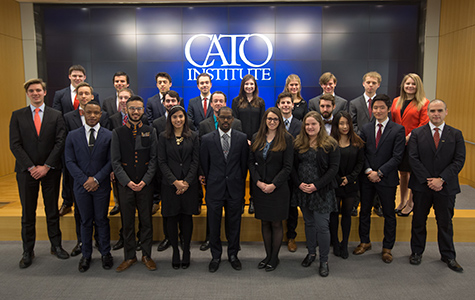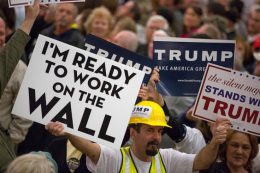It’s rather funny that the very people who go on about value being subjective act as if a “more productive” economy is objectively more valuable than all possible alternatives. If people subjectively prefer a more stable job market to one that produces more net total stuff, then why shouldn’t the proponents of the “subjective theory of value” see that as a viable reason to endorse protectionism? Even if protectionism does reduce the national GDP, one can still reasonably ask of what human beings need more: the stability of being better able to predict the future, or the dignity of having a job? Or a larger total quantity of mass-produced trinkets, while people drift from dead-end job to dead-end job?
Austrolibertarians tell us that there is no objective way to rank the utility of getting things desired now versus getting them in the future, and explain that interest exists to coordinate the differences in preferences for now versus later that exist between various individuals. They will then refrain – for good reason – from saying that investing is “objectively” better than consuming. Investments only exist, after all, so that they can eventually be consumed. So the Austrolibertarian, as an economist, can’t pass any judgement on whether a given person’s decision to save or spend was “right” or “wrong.”
But then they betray all of these principles. Even though – according to them – things like immigration and free trade have short-term costs combined with long-term benefits, they claim that it is objectively true that these policies are good and should be supported.
But this implies that there is an objective answer as to how one ought to weigh costs incurred “now” versus payoffs and returns received “later” – even granting their assumptions about the costs and benefits. What if I simply prefer knowing that I can train my children to work in the same industry in which I spent my life, giving me the ability to relax and trust that they and I will both have a secure future, to speeding up the process of competition and throwing myself and them into an unstable, constantly-changing job market, no matter how much that would raise the GDP for my grandchildrens’ generation?
As Sacco and Vanzetti Vandal’s A Call for Economic Nationalism notes, “Fifty years ago, permanent employment with the promise of a pension upon retirement was the standard in America. Now, temporary contracts that employ workers for either a few months or a few years have become the standard . . . globalization has destroyed permanent work.” This change, in and of itself, has an extremely significant effect on the human quality of life – and it simply isn’t captured by material measurements of the economy’s performance. It’s perfectly fine to debate whether taking on this kind of change in the national way of life is worth a given amount of “stuff.”
Models that reduce human beings to economic units tend to miss this point: a person relocating for work is very, very much unlike shipping a product to someone who wants it somewhere else. Goods don’t have preferences about where they live, but for human beings, these preferences are among the most significant in all of our lives. Moving can break down communities. It can take people away from communities they value and of which they want to be a part. It can significantly reduce a person’s chances of finding the kind of partner with which they would actually want to live their lives.
Ecologist Garrett Hardin (who coined the term “tragedy of the commons” in 1968) famously argued against unchecked mass immigration on Left-wing environmentalist grounds in his article on Lifeboat Ethics. Colin Hines, who worked with Greenpeace for ten years, is now making similar arguments about protectionism in the book Progressive Protectionism.
So now, of course, the mainstream Trump-hating Left will side with Forbes Magazine in opposing tariffs. But the desire to preserve local traditions and recognize that human dignity, security, and the protection of ways of life that people actually want to live can conflict with the desire to simply maximize the net total production of things. It has as much presence within the authentic Left as it does on the Right. Identity politics has simply corrupted whatever remains of any “authentic Left” worth talking about.
So how long do the “costs” of free trade last, and how long do the “benefits” take to materialize, anyway? A 2016 study on the “China Shock” found that:
These impacts are most visible in the local labor markets in which the industries exposed to foreign competition are concentrated. Adjustment in local labor markets is remarkably slow, with wages and labor-force participation rates remaining depressed and unemployment rates remaining elevated for at least a full decade after the China trade shock commences. Exposed workers experience greater job churning and reduced lifetime income. (emphasis mine)
The authors have several more important studies collected at The China Trade Shock. Another one, ”When Work Disappears: Manufacturing Decline and the Falling Marriage-Market Value of Young Men,” notes that trade shocks have directly contributed to “premature mortality among young males” while increasing the number of “mothers who are unwed and share of children living in below-poverty, single-headed households.” Again, stripping men of the dignity of work has social costs that go far beyond what can strictly be measured in GDP; it destroys communities, and it destroys relationships.
As Nick Fuentes rightly pointed out on Twitter recently, “The most vocal advocates for free trade always conveniently work in industries least effected by free trade. Harvard economists, CNN pundits, Cato institute interns – these people aren’t exactly feeling the pain from offshoring the way our machinists are . . .” Very few of these people run the risk of becoming deadbeat fathers who simply can’t find work dignified enough to support a marriage or children. But any real “conservatism” worth the name should at the very least put preserving families above maximizing GDP.

It makes perfect sense, then, why it is that, once we crunch the numbers, we see that living in areas affected by trade shocks very significantly predicted voting for Trump. Doesn’t this put the contempt with which Trump voters are seen in the mainstream media in a new light? The glee with which these people will dox and try to destroy the livelihood of members of the Dissident Right is just one illustration of the fact that they really don’t give a damn if white people are left to starve to death, jobless, and without a role to play in modern society. They complain; their concerns are ignored. They vote for someone who actually wants to do something about it, and the issues are obfuscated, while they themselves are treated with nothing but yet more spite and scorn. The crux of the “disagreement” here is that they really just do not care about the complete destruction of your livelihood if it means they can buy – mostly meaningless – stuff a little bit more cheaply.
Enjoyed this article?
Be the first to leave a tip in the jar!
Related
-
Whoever Runs Culture Always Ends Up Dominating the State
-
Notes on Plato’s Gorgias, Part 6: Two Concepts of Freedom
-
Whatever Happened to the Dirtbag Left?
-
Charles Murray’s Coming Apart: The State of White America, 1960-2010
-
Good and Bad Magic in Politics: John Michael Greer’s The King in Orange
-
The Organic Economy and the Society Based on Trade
-
The Folly of Quixotism, Part 2
-
A Forgotten Treasure from the 1970s: The Star Wars Holiday Special, Part 1

5 comments
I am no economist. Having said that my understanding of the dollar as the world’s reserve currency is that to obtain dollars the rest of the world has to sell goods to The States cheaper than the Americans can make them – with the obvious consequences.
I highly recommend the recent piece by economist Michael Hudson on the topic:
“A really nationalistic trade strategy is to buy raw materials cheaply, and sell finished manufactured goods at a high value-added price.
The idea of industrial protectionism, from British free trade in the 19th century to U.S. trade strategy in the 20th century, was to obtain raw materials in the cheapest places – by making other countries compete to supply them – and protect your high-technology manufactures where the major capital investment, profits and monopoly rents are.
Trump is doing the reverse: He’s increasing the cost of steel and aluminum raw materials inputs. This will squeeze the profits of industrial companies using steel and aluminum – without protecting their markets.” – http://www.unz.com/mhudson/a-travesty-of-protectionism/
For me personally, the tariffs are my “God Emperor No More” http://www.unz.com/article/god-emperor-no-more/moment.
I am officially off the Trump Train now, but I have no regrets supporting and advocating for Trump over the last almost three years (I started being a vocal supporter of his in September of 2015).
Commenter “Intelligent Dasein” put it well:
” I knew that this was our time to stand our ground and fight, and we did that. The Alt-Right has proven that it is able to think politically, to define objectives and to organize and pursue them with rational strategies. We are, as Greg Johnson said, “a government in exile.”
Despite the failures of our candidate, the fact that we managed to elect him was a real victory for us, and I will take that with me as I soldier onward.” – https://counter-currents.com/2017/04/thats-it-were-through/#comment-1384329
I would love to hear from other WNs and Alt Righters how you feel towards Donald Trump now and what the next steps for the movement should be?
Thank you.
I did not space the link properly, corrected version:
“For me personally, the tariffs are my “God Emperor No More” http://www.unz.com/article/god-emperor-no-more/ moment.”
Good article. Mainstream (neo-liberal) economics maintains that free trade increases productivity by allowing producers to benefit from their ‘natural competitive advantages’.
For manufactured goods, one of the most significant advantages is cheap labour. While it’s debatable as to whether paying your staff subsistence wages counts as a ‘natural’ advantage, one fact that’s not debatable is that cheap labour acts as a disincentive to investment in automation. Corporations, looking to maximise shareholder value and usually with no loyalty to any nation or place, will offshore their operations to low cost production centres because it’s cheaper and easier than investing in tech.
It may be that if protectionist trade measures become widespread in the future, the balance will tip and companies will look more favourably on investing in automation as a way to stay competitive. The cheapest labour in the world will not compete with sufficiently advanced technology.
In the meantime, cheap-labour based free trade acts as a handbrake on the development of new forms of manufacturing which will be far more productive than anything seen to date.
.
Great article.
Comments are closed.
If you have Paywall access,
simply login first to see your comment auto-approved.
Note on comments privacy & moderation
Your email is never published nor shared.
Comments are moderated. If you don't see your comment, please be patient. If approved, it will appear here soon. Do not post your comment a second time.